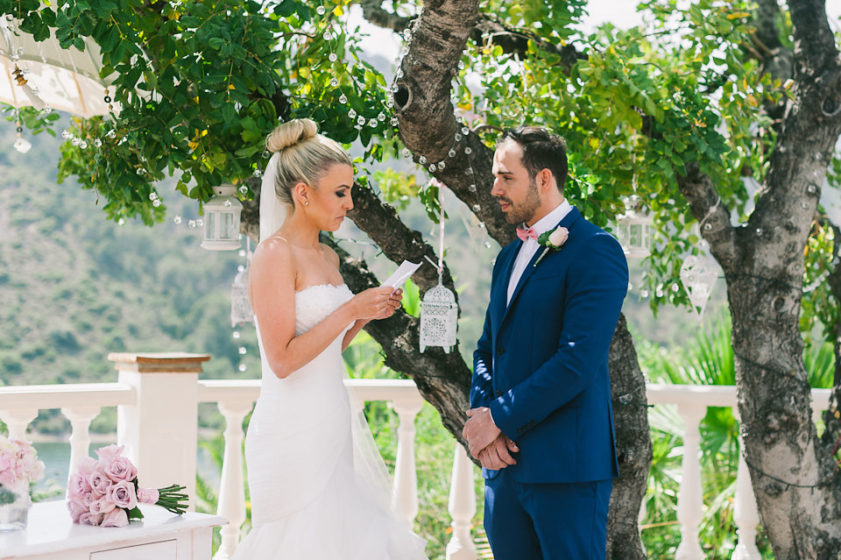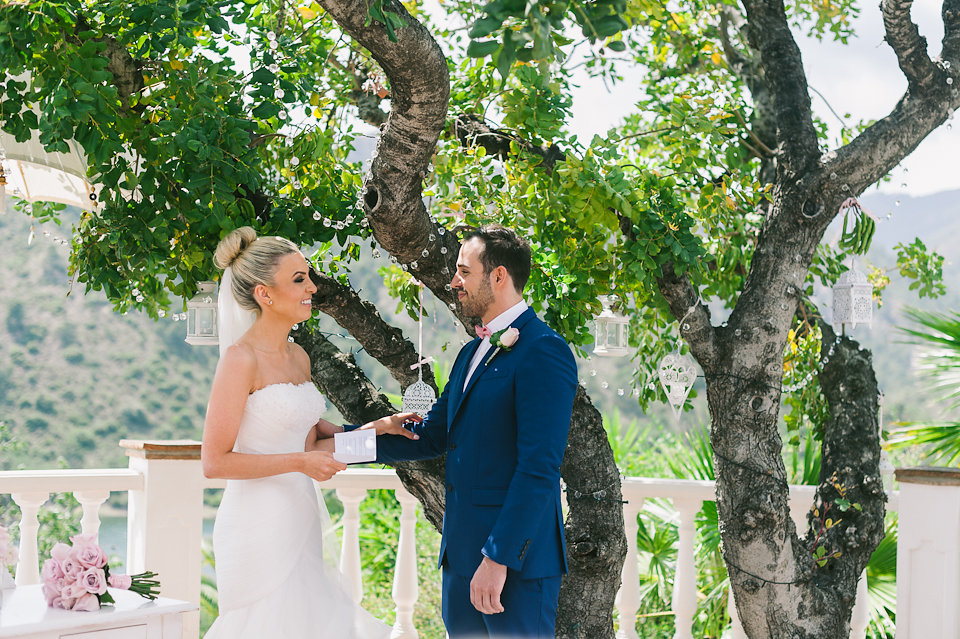
So, I’m going to start this post by already assuming that you will be writing personal vows for your wedding ceremony. This means that you and your love bunny are in agreement about it, cannot wait to do them and that at some point in the near future you’ll be settling down and trying to put pen to paper. BUT, (you know I love to capitalise my ‘buts’) have you actually thought about how you will be saying your vows? Will you be a reader, a reciter or a repeater? If you’ve no idea, then how lucky you are that I have written this post for you!
It’s one thing writing your vows, but it’s another thing knowing how you are going to deliver them. Sometimes how you will say them, may shape what you write and vice versa, so it’s a good idea to work out the best delivery method for you before writing your vows. And hopefully, this little guide that I will set out for you will help you decide how you want to say your vows.
Before I break down the options and because I ALWAYS love to give my opinion, for me the most preferred method is when couples write and say their own vows themselves. And when I mean say, I mean read them from a piece of card. In a nutshell, this way of saying your vows are intimate, they are direct in that they are said from you to your love bunny with no interruptions or repetitions, and that is that. But I totally get that not everyone feels comfortable with this way of doing things, so let’s take a look at the options which will help you to make up your mind.
Reading your vows to one another
Seeing that this is my favourite method, I thought I’d start with it first, in more detail. I think there are so may benefits of being able to read your vows directly to your love bunny. When two people share their vows with each other, it is tantamount to one heart speaking to another. So in my eyes, being able to speak directly to your love bunny during your ceremony is the nicest way to share your vows. Some people feel that reading vows means that they will not come across as natural, but I think that’s not always true. Most couples who I’ve seen read their vows to each other, have a good idea of what they are saying (as they’ve been practising) and so when they read their vows they are able to use them more as a guide than reading them one for word, as though they’ve never seen them before. Also, having your vows written down means that you have a point of reference to hand. Everything you want to say is written down in front of you, so there is no way that you will forget them or muddle up what you want to say, which is SO easily done due to the state of your brain on your wedding day. You can also read your vows naturally by looking up at your love bunny after every few lines, as this is another thing that couples worry about, that they won’t be looking at their partner when saying their vows. By glancing up at them after every line or so, you can maintain eye contact and help to keep that flow of love and emotion.
I would also recommend typed vows over hand-written, unless your handwriting is really neat and tidy, or of course you can read your own chaotic writing very well! If printing, a big, clear type face and double spacing can also be handy, so those teary eyes have an easier task to perform.

Reading your vows doesn’t have to feel unnatural. Hold on to your love and glance at the end of each line will help you to maintain a connection and all the emotion. Photo by Agata Jensen.
Reciting your vows
For many people, the idea of being able to say your vows from memory is a very romantic one and one which has a very natural feeling about it, because if done well it does look like you are making a beautiful and very natural declaration of love to your partner. No prompts, no paper, just a lovely, free flowing speech. BUT people, you’ve got to bear in mind that this is hard to do. The end game can be beautiful but achieving it is not easy, and in most circumstances I would dissuade couples from doing this. Why? Well, firstly, we’re not talking about any old day, we’re talking about your wedding day. No-one really can predict how they will be on their wedding day, but one thing I know for sure, is that you have very little control over your emotions on that day! It really is a roller-coaster of feelings; fear, anxiety, euphoria, nervousness, delight. It all hits you, in all sorts of ways at different times throughout your day, coming and going as they all please. So adding the pressure of memorising something as important as your wedding vows into that mix, is not something to be taken lightly. A few years ago, I had a lovely lovely groom who was determined that he would recite his vows. I told him exactly what I’ve just told you, and he was unmoved. I told him to bring them printed out anyway, just in case and he said he wouldn’t need them. The moment came and he started his absolutely stunning and well thought out vows. He got a few lines in, he stuttered and then he looked blank for a moment. I handed him his vows that I had printed off in preparation (he gave me the biggest smile ever!) and he continued saying them, using the written vows as a prompt for when he needed it. I really did applaud his determination, but I also know how easy it is to forget your own name on your wedding day!
So the moral of this story is your brain can do funny things in the moment you need it not to do funny things. So I would recommend, that even if you want to go down this route, you should have your vows printed off anyway, so that if your memory does go, you can use your vow cards. And because you will already be so well practised the vow card will be more of a prompt rather than something you will be reading from word by word, so you will still be able to achieve that natural sounding speech, if you prefer it that way.
Repeating line by line
This option, in my experience is usually picked by couples who are lacking in confidence over speaking in public and feel they would be more comfortable if the celebrant said one line of the vow first, which they then repeat back. This means they don’t have to worry about holding any vow cards, about reading anything or memorising anything, because they will be led through the vow process by their celebrant. I do understand why this way is very appealing to people, especially when you’re nerves start to get the better of you. It’s so much easier to go for the safest and least stressful option. The downside to this method, in my opinion, is that it can take away that lovely intimacy that the very nature of your vows can create. It breaks up the dialogue between you and your love bunny by including a third party (your celebrant) to interact alongside you. It also makes your vows very repetitive, especially in the case where you are both making the same promises to each other, this would mean that in total, each line of your vows will be said three times, by your celebrant, you and your love bunny. This way of saying your vows is also not so appropriate if your vows are longer than average or if you have written very personal vows. They work well with promise vows, but if you plan on writing vows which clearly are you talking about your love bunny, what you love about them, how they make you feel and what promises you want to make to them, these type of vow do not lend themselves to being read out firstly by someone else. If you’re a little unsure about the different types of vows that there are, then check out this post that I’ve written on the different styles of vows. If you are someone who really is terrified about saying your vows, then maybe you might want to consider reading them yourself rather than repeating them line for line. I know the idea of someone helping you out during your vows is a wonderful security blanket to have but really explore all of the different vow options to help decide if this is the right way for you.
As always, everything you decide has to be right for you.

